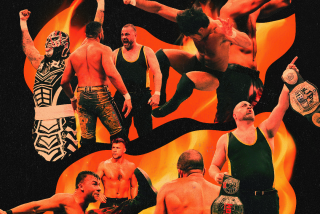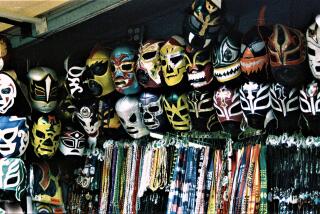THE 1978 PAN AMERICAN GAMES : THE NEW AMERICANS : Soviet Emigre Is Giving U.S. Wrestlers Big Boost
- Share via
INDIANAPOLIS — You’ll have to forgive Pavel Katsen. He’s been an American for three years now, and he can’t understand why Greco-Roman wrestling isn’t the great American sport.
Katsen, a coach who emigrated from the Soviet Union in 1979, became a U.S. citizen in 1984. He has acquired American tastes in everything from cheeseburgers to baseball. Well, OK, he likes baseball highlights , the ones you can see every night on ESPN.
“I like the skills in baseball,” he said, choosing his words carefully during a break in the Greco-Roman competition at the Pan American Games Tuesday. “But to sit and watch an entire game for three hours. . . . I would rather watch the highlights.”
Now, Greco-Roman wrestling, that could be the real All-American game, according to Katsen.
“It’s so American ,” he said, gesturing vigorously. “Greco-Roman is what Americans are all about. It’s man vs. man, face to face. It’s taking great risks in order to win. It’s all about bravery, about being strong enough to meet the challenge, to be the best. See, that’s what America itself is all about.”
Centuries old, Greco-Roman wrestling is the same as freestyle wrestling, with one basic exception: There are no holds below the waist. And Pavel Katsen is like most coaches, with one important exception. He’s something special.
Said Bob Dellinger, staff member of USA Wrestling, amateur wrestling’s governing body in this country: “(Katsen has) been with our program only a short time, and already he’s made a big impact. We’ve got one world champion, Mike Houck (at 198 pounds), and Pavel spent a lot of time with him.
“Pavel had a great wrestling background in Russia and in addition to that, he’s simply an outstanding coach. He’s enthusiastic about everything, including this country, and that enthusiasm carries over to his wrestlers.”
Katsen is assisting U.S. Coach Bob Martell at the Pan Am Games here. When the wrestling competition ends, Katsen will be the head coach of an American team in the World Championships in Clermont, France. Katsen, a 42-year-old bachelor who lives in Brooklyn, also has been appointed head coach of the U.S. Greco-Roman team for the 1988 Olympic Games.
He is reluctant to discuss the circumstances of his 1979 departure from the Soviet Union, saying: “I emigrated, I did not defect. I came to the United States because it’s a free country . . . it’s the greatest country in the world.”
Katsen, a squarish, heavily muscled man, was from Riga, the capital of Latvia. He was the Soviet Union’s national junior coach when he left. He was a regional Greco-Roman champion in the Soviet Union and missed by one bout making the 1968 Olympic team.
He says the Soviet Union’s new glasnost policy--openness--has touched sports.
“I was issued a visa to visit the USSR in June when I was coaching a U.S. wrestling team on a tour there,” he said. “I was treated well. There were no problems. Before glasnost, they would not let me back. Can’t we talk about American Greco-Roman wrestling?”
Katsen said that the United States may never approach the depth of talent Eastern Bloc nations have in international wrestling, but that there is promising first-string talent in the United States.
“The Soviet Union, East Germany, Bulgaria--those eastern countries are six to eight wrestlers deep in every weight class, wrestlers capable of winning in international competition,” he said. “In this country, we have some great individuals, but not that kind of depth.”
To Terry McCann, U.S. Olympic freestyle wrestling gold medalist in the 125-pound class in 1960, Pavel Katsen has given American Greco-Roman wrestling what it needed--a kick in the pants.
“This guy’s input has been tremendous,” he said. “Greco-Roman wrestling in this country had no direction before he came along, no role model. We had no one with that foundation, no one with the feel he has for the sport. And in addition to his great background, he’s a great communicator and motivator. He gets our kids fired up, believing in themselves.”
Asked to describe his coaching technique, Katsen said it’s mostly salesmanship.
“Here is what I am selling,” he said. “First, I sell a wrestler on the idea of believing in himself. Then, I help him establish a reasonable goal for himself, and help him achieve it.”
The interview concluded, the reporter prepared to leave.
“Wait,” Katsen said. “Don’t forget, Greco-Roman wrestling is beautiful. It’s a combination of boxing, judo and freestyle wrestling. The action never stops. People should see it.”
And he’s not talking about just highlights, either.
More to Read
Go beyond the scoreboard
Get the latest on L.A.'s teams in the daily Sports Report newsletter.
You may occasionally receive promotional content from the Los Angeles Times.






